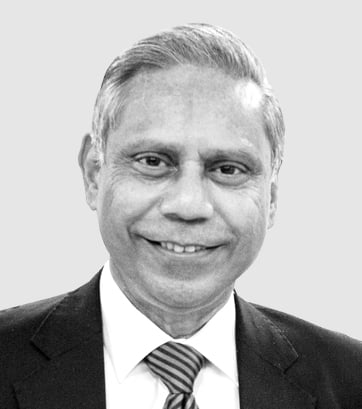Pakistan’s unsung icon
October 16 was the 70th death anniversary of Nawabzada Liaquat Ali Khan. Pakistan was deprived of both its founding fathers in the first few years of its inception. Quaid-e-Azam Muhammad Ali Jinnah sacrificed his life, because he was suffering from a terminal disease, which he ignored because it was a race against time. If the detractors of Pakistan had caught wind of his fragile health, all they had to do was delay the process and there would have been no Pakistan. Consequently, the Quaid barely survived the first year of Pakistan’s independence and during most of it he was incapacitated. It befell his closest companion and staunch follower Nawabzada Liaquat Ali Khan to pull Pakistan through those first years of post-natal pains.
Throughout the struggle for Pakistan, Liaquat Ali Khan had followed the advice and guidance of the Quaid. Likewise, Mr. Jinnah had been dependent on the steadfast companionship of his most trusted lieutenant Liaquat Ali Khan. However, after the demise of the Quaid, Liaquat Ali Khan was on his own to shape the destiny of the fledgling nation, devoid of the steady hand of Mr. Jinnah on his shoulder.
Pakistan’s enemies within and without were numerous. Liaquat Ali Khan was a stumbling block to their heinous machinations. Scrupulously honest, incorruptible, humble, astute statesman and firm disciplinarian, Liaquat had numerous friends and admirers but also many detractors who had either personal scores to settle or became pawns of the enemies of Pakistan, who wanted to stifle Pakistan’s growth.
On 16 October 1951, the Quaid-e-Millat, was gunned down by a hired assassin, while he was about to commence his address to a public gathering in Rawalpindi. As he fell, reciting the kalima, his final words were “Allah Pakistan ko apne amaan main rakhay” (God save Pakistan).
This was the first political murder in the nascent history of Pakistan and by no means the last, but it definitely changed the course of history.
Unfortunately, the selfless Liaquat Ali Khan’s Herculean achievements to put Pakistan on the rails of progress have been clouded in senseless character assassination by the pygmies who plotted his removal. As a result, even the landmark 70th death anniversary of this founding father passed unheralded and unobserved.
Nawabzada Liaquat Ali Khan, the second son of Nawab Rustam Ali Khan, Ruken-ud-Daulah, Shamsher Jang, Nawab Bahadur was one of the few landlords whose landed property was spread in the two provinces of India: Punjab and United Provinces. Yet in his quest for serving Pakistan, he donated his entire property and wealth for the cause of Pakistan.
Pakistan’s successive political leaders need to learn lessons from this great man. His contributions are numerous. After the failure of the series of Round Table Conferences, disgruntled by the infighting and squabbles of the Muslim leaders, Quaid-i-Azam chose to go back to England in self-exile. Realizing that the only leader who could unite the Muslims and lead them to their destiny was Mohammad Ali Jinnah, Liaquat Ali Khan took it upon himself to persuade him to return to India. The rest is history.
After winning in the Central Legislature election in 1945-46 from the Meerut Constituency in UP, Liaquat Ali Khan was given the portfolio of finance, which he handled brilliantly, presenting a poor man’s budget, based on national foundations. With sharp prescience and forethought, Liaquat Ali Khan, having become convinced that Pakistan was inevitable and after independence, the fledgling nation would require funds so as Finance Member (Minister), he tasked the Central Bank of India to have currency notes printed and deposited in banks in Peshawar, Quetta, Karachi, Lahore and Dhaka. After 14th August 1947, especially when India withheld Pakistan’s share of the finances, these deposits came in handy for the cash-strapped nation in meeting some of its expenses and disbursing the salaries of government servants.
In my TV program Defence and Diplomacy, Brigadier Noor Hussain, the last ADC of the Quaid said that on Eid Day in 1950, Khawaja Nazimuddin, the second Governor General, invited Prime Minister Liaquat Ali Khan, his wife and Fatima Jinnah for lunch. During the course of the meal, Liaquat Ali Khan’s wife, Begum Ra’ana, addressing the Governor General, stated, “Khawaja Sahib, if something happened to my husband, my two sons and I would be out on the street, since we don’t even have a roof over our head.” Before the host could respond, Liaquat spoke up: “First, the five million refugees to Pakistan have to be settled. Once each and every one has been settled, only then my turn will come.”
It is a fact that within a year, Liaquat was martyred, leaving behind vast estates in India, but never claimed even an inch of land in Pakistan. He also donated his palatial house in New Delhi to the Government of Pakistan, to be used as the Chancery and later the official residence of the High Commissioner. When he died, his bank account comprised only a few hundred rupees. When his mortal remains were taken to the hospital, it was discovered that his socks and vest had holes in them; both the sleeves of his sherwani were darned at the elbows. After his death, his widow had to take up a government job to support herself and her two sons.
It is time that we recognize the sacrifices and contributions of this unheralded founding father with the respect due to him.
October 16, 2021 was Nawabzada Liaquat Ali Khan’s 70th death anniversary.
The writer is a former Group Captain PAF and an author.










